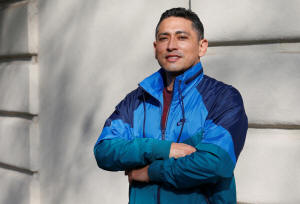As Delta spreads, some travelers double up on COVID-19 vaccine in U.S.
 Send a link to a friend
Send a link to a friend
 [August 16, 2021]
By Ahmed Aboulenein [August 16, 2021]
By Ahmed Aboulenein
WASHINGTON (Reuters) - Alison Toni felt
lucky to get Sinovac's COVID-19 vaccine in Chile earlier this year. A
month later, she was in Minnesota getting vaccinated again.
Toni, an American living in Chile, was visiting her parents in
Minneapolis in April when she got her first Pfizer shot at a CVS
pharmacy. She traveled back for the second dose in June. She did not
disclose being previously vaccinated.
"They didn't ask, and I didn't tell," said Toni, 55. She took that step
after reading that China's Sinovac vaccine had a lower efficacy than the
Pfizer Inc shot, developed with German partner BioNTech, and the Moderna
Inc shot, both widely available in the United States. She also consulted
with her doctor beforehand.
Toni is among the group of people coming from abroad who have been
vaccinated a second time, or plan to do so, in the United States.
Their reasons range from concerns that the vaccines immediately
available to them were not effective enough, fears that they require
extra protection against the fast-spreading Delta variant, or a need to
meet specific requirements for work or travel. Some are seeking medical
advice, others are relying on their own research.

A few countries are also beginning to offer a third booster dose to
their citizens based on evidence that the initial protection from
vaccines wanes over time, or that an extra shot may help prevent
infection against Delta, particularly for older people or those with
weak immune systems.
Public health officials have not determined if booster doses are needed
for the general population, and there is not yet much data on the
relative risks and benefits of complete revaccination.
"It is probably more than is needed," said Jason Gallagher, an
infectious diseases expert at Temple University's School of Pharmacy. "A
fourth dose is probably a waste; a third dose is probably unnecessary
for a lot of people."
The World Health Organization (WHO) has urged countries to hold off on
boosters while many people worldwide wait to receive their first doses.
Thirty-six-year-old Chilean engineer Ricardo Dayne, who first received
Sinovac's vaccine at home in April got his first Pfizer shot in New York
in June.
"Everyone was also talking about the need to have a booster, so I
decided to have it."
'PROCESS NEEDS TO BE FIXED'
The U.S. Food and Drug Administration (FDA) last week authorized a third
vaccine dose for immunocompromised people. Government health
officials have estimated that would apply to less than 3% of the adult
U.S. population, but have said that eventually, boosters may be required
more broadly.
In the meantime, a surplus of vaccines in the United States, along with
a decentralized healthcare system, has made it easier for people to show
up at pharmacies and vaccination centers for extra doses. The U.S.
Centers for Disease Control and Prevention estimates that over 1.2
million Americans have already received at least one extra dose
following their initial inoculation.

[to top of second column]
|

Ricardo Dayne poses for a picture during an interview with
Reuters in Santiago, Chile August 12, 2021. REUTERS/Rodrigo
Garrido

When asked about travelers doubling up on vaccines,
Moderna told Reuters its vaccine is not authorized for this purpose
and J&J directed Reuters to the FDA and CDC. Pfizer did not
immediately respond to a request for comment.
A CVS Health Corp spokesperson said the company's
policy is to turn away patients who have been fully vaccinated at
one of its pharmacies, or who disclose that they have been fully
vaccinated elsewhere. A Walgreens spokesperson said its pharmacies
ask patients if they have been vaccinated during the appointment
process and have alerts in place to check.
Graduate student Jing Wu, 22, said he had no choice. Wu received the
Sinovac vaccine in December while in China before moving to the
United States to attend Princeton University.
He heard Princeton was planning to require proof of an FDA-approved
vaccine. The university's health service urged him to get vaccinated
again and said it would be safe.
He was not reassured.
"I was nervous and stressed about it, but in April I got vaccinated
(again)," he said, this time with the Johnson & Johnson shot.
Princeton announced the policy on April 20 but later decided to
accept any WHO-approved vaccine, including Sinovac. The university's
health website still states that "there is no known harm from taking
additional" vaccines.
The university did not respond to requests for comment.
"If I knew back then the Chinese vaccine would be enough, I wouldn't
have done it," Wu said.
The United States is developing a plan to require nearly all
foreign visitors be fully vaccinated, potentially creating similar
issues for many people inoculated with vaccines not approved by the
FDA.

Britain and the European Union's lists of approved vaccines do not
include shots made in Russia or China, which have been used in many
countries.
Governments should standardize their definition of fully vaccinated
to include shots that may not be approved in their countries, but
which are still effective, said Dr Amesh Adalja, senior scholar at
the Johns Hopkins Center for Health Security.
"This whole process needs to be fixed, otherwise, as we get more
vaccines and more people traveling, this will only happen more,"
Adalja said.
(Reporting by Ahmed Aboulenein; Additional reporting by Aislinn
Laing in Santiago, Carl O'Donnell and Michael Erman in New York;
Editing by Michele Gershberg and Aurora Ellis)
[© 2021 Thomson Reuters. All rights
reserved.] Copyright 2021 Reuters. All rights reserved. This material may not be published,
broadcast, rewritten or redistributed.
Thompson Reuters is solely responsible for this content. |